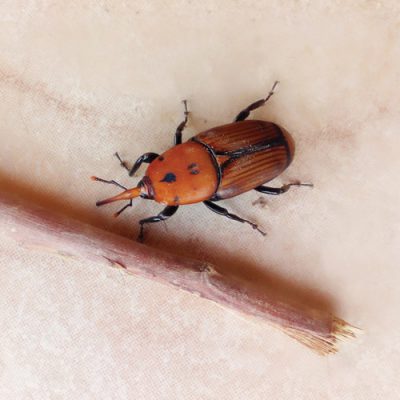×


We have detected your country as:
Please click here to go to the USA website or select another country from the dropdown list.
by: Jo Sarah Stanford
 The red palm weevil is an invasive pest that decimates palm crops across the world, but an Israeli bio-company has developed a new pesticide that can stop it in its tracks.
The red palm weevil is an invasive pest that decimates palm crops across the world, but an Israeli bio-company has developed a new pesticide that can stop it in its tracks.
The red palm weevil (Rhynchophorus ferrugineus), also known as the Asian or sago palm weevil, is a reddish brown insect that measures about 3–5 centimeters (1.2–2 in.) in length. The adult female bores a hole into the palm tree and can lay approximately 350 eggs in its short lifespan of three months. The larvae hatch and grow to about 5 centimeters (2 in.) in size as they eat through the insides of the tree trunk. The larvae cause significant structural damage to the tree. Unable to get enough nutrients through its trunk, the tree dies.
Originally from Asia, the weevil quickly spread to Europe, Africa and the Mediterranean in the 1980s. It was found in Spain in 1994, Israel in 1999, France in 2006, and in 2010 it was also found in the United States. It now causes problems in 60 countries across the world.
The red palm weevil is difficult to detect, as it spends most of its life cycle inside the tree. By the time the damage is found, the tree has usually suffered too much deterioration to be saved. Detection methods include visual inspections, infrared imaging and sniffer dogs, while eradication is usually done by pheromone traps and pesticides—all with varying degrees of success.
However, Israeli start-up PlantArcBio has conducted laboratory tests with a 100% kill rate. The company has developed this biological pesticide with the help of agricultural research Professor Moshe Bar-Joseph and an unnamed third party. According to the Times of Israel, the pesticide replicates part of the insect’s own genetic material, using it against itself. They are now researching the best in-field delivery methods, but hope to have a viable product on the market in three years.
This can come none too soon for date, coconut and other palm tree farmers, who have seen the decimation of crops, affecting the livelihood of thousands of people. In the Middle East alone, the weevil costs farmers US $8 million every year.
PlantArcBio is confident in results thus far and has received US $3 million in funding from investors, as well as grants from the Israel Innovation Authority. The company hopes to see the eradication of this pest, making life easier for Israeli date farmers and farmers all across the world.
Source: Bridges for Peace
Photo Credit: Angelese/pixabay.com
All logos and trademarks in this site are property of their respective owner. All other materials are property of Bridges for Peace. Copyright © 2025.
Website Site Design by J-Town Internet Services Ltd. - Based in Jerusalem and Serving the World.